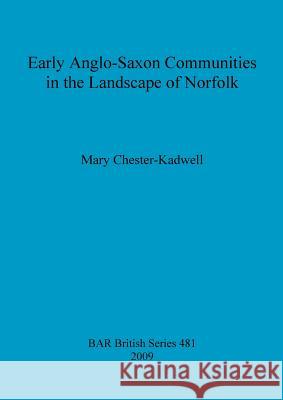Early Anglo-Saxon Communities in the Landscape of Norfolk » książka
Early Anglo-Saxon Communities in the Landscape of Norfolk
ISBN-13: 9781407304168 / Angielski / Miękka / 2009 / 254 str.
This work is a study of Anglo-Saxon mortuary and settlement practices in the landscape of Norfolk (eastern England) from the early fifth to the early seventh centuries AD. It considers the places chosen by communities as cemeteries and settlements, and asks why they made these choices. It also investigates how metal-detector finds reported by members of the public, and commonly interpreted as mortuary material, may be used to inform an understanding of these issues. The author examines the juxtaposition of cemeteries and settlements in relation to the geographical and historical landscape, trying to fit cemeteries back into the context of local communities, particularly considering the soils which may have helped to structure the practices of rural life.The first part of the book is devoted to establishing an interpretative framework and advancing an argument about community practice. The second part of the book is concerned with community practice in the case study area of Norfolk. Conclusions on the implications of the analysis are made, and some directions for future research are suggested. Important to the approach is a contextual analysis, both for understanding the data and for contributing to the formation of ideas in Anglo-Saxon archaeology. Metal detected artefacts, which have been disturbed from their original deposits, are given meaning by incorporating them into the full body of evidence from excavations, strayfinds, fieldwalking, and aerial photography.
This work is a study of Anglo-Saxon mortuary and settlement practices in the landscape of Norfolk (eastern England) from the early fifth to the early seventh centuries AD. It considers the places chosen by communities as cemeteries and settlements, and asks why they made these choices. It also investigates how metal-detector finds reported by members of the public, and commonly interpreted as mortuary material, may be used to inform an understanding of these issues. The author examines the juxtaposition of cemeteries and settlements in relation to the geographical and historical landscape, trying to fit cemeteries back into the context of local communities, particularly considering the soils which may have helped to structure the practices of rural life.The first part of the book is devoted to establishing an interpretative framework and advancing an argument about community practice. The second part of the book is concerned with community practice in the case study area of Norfolk. Conclusions on the implications of the analysis are made, and some directions for future research are suggested. Important to the approach is a contextual analysis, both for understanding the data and for contributing to the formation of ideas in Anglo-Saxon archaeology. Metal detected artefacts, which have been disturbed from their original deposits, are given meaning by incorporating them into the full body of evidence from excavations, strayfinds, fieldwalking, and aerial photography.











